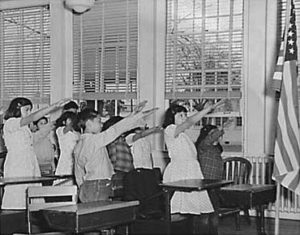In an editorial, the Los Angeles Times is celebrating a decision of the Sixth Circuit Court of Appeals holding that a good education is a constitutional right and, therefore, that states have a legal duty to provide it to children. The court’s decision and the Times’ celebration of it only goes to show how America’s welfare-state way of life has warped and perverted sound thinking with respect to the nature of rights and the purposes of the Constitution.
The U.S. Constitution called into existence a limited-government republic, a type of governmental system by which the federal government’s powers would be limited to those enumerated in the Constitution. If a power wasn’t enumerated, then it could not be exercised.
There is no grant of power in the U.S. Constitution to provide education to anyone.
Despite its name, the Bill of Rights also does not grant anyone the right to an education or, for that matter, any other right. The first ten amendments should really have been called the Bill of Prohibitions. Rather than giving people rights, they prohibit the federal government from infringing on rights. Our ancestors understood that such rights as life, liberty, property, and the pursuit of happiness don’t come from government. They come from nature and God and, therefore, preexist government.
Freedom entails the right to live your life the way you choose, so long as you are not violating other people’s rights through violence or fraud. Thus, as long as you’re not engaging in murder, theft, rape, and other such crimes, freedom entitles you to make whatever choices you want, even if everyone else disapproves of them.
Thus, no one has the right to initiate violence or fraud against another person because to do so violates his right to live his life the way he chooses. If someone does violate the rights of another person, that’s when government steps in and arrests, prosecutes, convicts, and punishes the malefactor. That’s in fact one of the legitimate functions of government.
Thou shalt not steal
Let’s assume that I accost you in a dark alley and rob you of $5,000. I am very poor and my child is not getting a good education in public schools. I use the $5,000 to pay the tuition for a private school that has accepted my child.
Do I have a right to do that? If you subscribe to the reasoning of the Sixth Circuit, I do. Remember: the Court is saying that my child has a right to an education. If he’s not getting it in public school, then what’s wrong with my stealing your money and using to get my child his education? I’m just exercising my child’s “right” to a good education.
Now, granted, neither the Court nor the Times would countenance private stealing, even stealing that fulfills a perceived “right” to an education. But their reasoning does countenance political stealing that in principle is no different.
If a child has a “right’ to an education, then someone has to be forced to provide it. That would be the state. But no state government has money of its own. They all get their money through taxation, which is based on force. Thus, under the Sixth Circuit’s reasoning, the state is required to forcibly take money from its citizens — i.e., politically steal from them — to fulfill the “right” of children to an education.
And what if no one wishes to teach? Under the Sixth Circuit’s reasoning, a citizen doesn’t have the option of saying no. If no one wants to fulfill a child’s “right” to an education, then teachers would have to be conscripted — that is, forced — to teach. Refusal to do so would amount to violating someone’s “right” to an education.
The welfare state
And why stop there? If people have a “right” to an education, then why not also a right to housing, clothing, food, a car, a television set, a computer, and other things? Why not just have a giant taxing scheme that sucks trillions of dollars out of the income of the citizens and provides a gigantic pool of money to dole out to people to fulfill their “right” to be provided for by the state?
Oh, I forgot! That’s the system we already live under. That’s what the welfare state is all about!
Interestingly, the Sixth Circuit and the Times limit their reasoning to children. But there are lots of adults in the United States who are illiterate, at least in English. Why don’t they have a right to an education too? Where in the Constitution does it say that only children have a right to an education? Shouldn’t the states be required to set up tax-funded education institutions and bureaucracies to fulfill the right of adults to an education?
Rather than decree that people have a “right” to an education, what the Sixth Circuit should have done is declare the state’s compulsory school-attendance law unconstitutional as a violation of liberty, which is a natural, God-given right protected by the Constitution. After all, the Fourteenth Amendment is clear: No state shall deny any person liberty without due process of law.
For more insights into the right of educational liberty, read FFF’s award-winning book, Separating School & State: How to Liberate America’s Families by Sheldon Richman.




